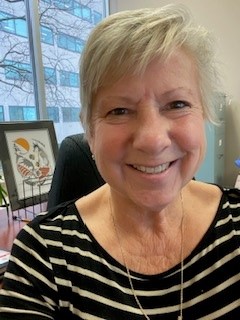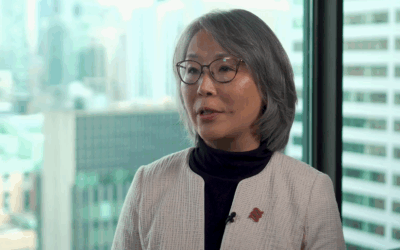
Jodi’s Story
Jodi Walsh is an ODSP caseworker in the Social Assistance Program at MCCSS.
As one of the main caregivers for her grandmother Elaine’s journey through Alzheimer’s, Jodi gives a clear picture of what it means to have the disease and what it means to be a caregiver.
While it would seem to the uninitiated that Alzheimer’s symptoms would be obvious, there are other health issues that may cloud the problem and she recommends not taking any steps until a complete assessment is done by a neurologist or a geriatric specialist.
Once the diagnosis was complete, her Nana started to experience suicidal thoughts. As well, given that she lived alone in a rather isolated area near water, the family were concerned that she would wander into the bush or fall into the water/marsh so they registered her for Long Term Care. She was in LTC for about 3 years. They were very fortunate to get her in where they wanted as she was only on the list about a year. However, once she moved from her own home to assisted living she declined rapidly to the point where she was considered critical.
They felt guilty at the time but also relieved that she would be protected and taken care of. Jodie remarked in her talk that caregivers must let their guilt go and do what is best for the patient’s wellbeing. As well, it reduced the level of burnout that the family was experiencing.
The Alzheimer’s Society also assisted by helping the family to get a realistic cat toy for company for Elaine and also providing a phone with no buttons so she could not longer call 911. She could only receive calls from the family.
Jodi remarked that the worst time for her family was when Elaine no longer knew who they (her family) were but were happy she knew who she was, and realized that she just saw herself as a younger version and they would need to ask her how old she was to give context to any discussion. She also like talking directly to God and hoarding and carrying a pile of tissues everywhere she went.
After her Nanna passed, Jodi advises that, regardless of how involved you are in the daily care, the loss is hard and all caregivers must go through a grieving process in order to feel right with their loved ones end and also to cope with the pain of loss.
Jodi has written a book on her experiences as a caregiver. You can access copies here.
https://www.amazon.ca/Nana-Elaine-Chronicles-Alzheimers-Dementia/dp/1039178049
Nana Elaine Chronicles | Facebook to order Jodi’s book and to join the Facebook group page

Cathy’s Story
Cathy Dranitsaris is Manager, Solutions Architecture Delivery, Labour and Transportation I&IT Cluster at MTO
Cathy started to suffer symptoms when she was quite young, including being bloated and developing anemia. It wasn’t until her 19th birthday that she discovered she had Crohn’s Disease though not before doctors said they thought it was pelvic inflammatory disease and said they were going to remove her reproductive organs. They didn’t but they did take 1.5 feet of Cathy’s bowel and give her the correct diagnosis. After the correct diagnosis and surgery, they advised her that Crohns was caused by stress and advised her not to work and let her husband take care of her.
Prior to her second surgery, many years later, one of those specialists from the first surgery came to visit and asked her if she had ever seen him and what advice he gave. Cathy was honest and told him. He apologized and said that was all they knew then.
And Cathy’s response, “Imagine if I had listened! The career I would have missed and how different the life I currently have would have been. Research, funded by the Crohn’s and Colitis Canada, helped to identify that stress was not a cause so future generations would not have to deal with this type of misdiagnosis.”
As a teen in college, her friends didn’t understand her problems and were embarrassed by what it was so Cathy began to hide it – that continued for 20 years. Sometimes when she couldn’t hide it, she was accused of lying at work.
Cathy now feels that the problem was lack of knowledge and understands that there needs to be awareness to inspire empathy. And this, she feels is the role of Crohn’s and Colitis Canada.
While she herself has not used their services directly, she does work for them as a volunteer and raises donations through participating in the Gutsy Charity Walk and attending other special events. No wonder she volunteers for the Federated Health Charities’ campaign.
Throughout her life, she has had many 911 episodes as well as having a bowel obstruction, caused by the initial surgery and which was the start of more surgeries. But she has persevered throughout, working hard at her job at MTO as well as helping out with the campaign. While on vacation in Italy recently, Cathy ran into someone on her tour who understood what she was going through and it made Cathy more comfortable and she also realized that with awareness in society, people with Crohn’s and Colitis have gone from hiding it to talking openly.







